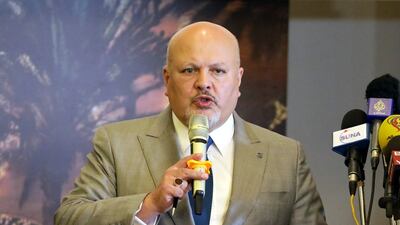The chief prosecutor for the International Criminal Court, Karim Khan, has published a guide to help nations gather evidence to help convict war criminals.
It comes before a meeting with UK Foreign Secretary James Cleverly at the UN General Assembly on Thursday.
Mr Khan is leading an investigation into alleged Russian atrocities in Ukraine.
It is hoped the guide will help to build effective cases against those responsible for war crimes.
"Civil society organisations are critical partners in our common goal to achieve accountability for international crimes," he said.
"Now more than ever we must work together to strengthen our common work towards justice. Through this publication, we also seek to highlight how we can work together more effectively to protect the most vulnerable when engaging in documentation efforts.
"This is particularly important in situations involving crimes against children or victims of sexual abuse. It is my hope this document can serve as a basis for deepening this dialogue together."
The guidelines have been drawn up between the Office of the Prosecutor at the ICC, Eurojust, the Genocide Network, civil society organisations, national prosecutors and international partners.
"With the war in Ukraine, peace and justice are under the most severe pressure and accountability for core international crimes and violations of human rights is more than ever essential for international criminal justice," said Eurojust president Ladislav Hamran.
"These guidelines will be a key building block in efforts of authorities and civil society organisations to collect and preserve information and evidence that may become admissible in court. With this joint effort of Eurojust and the Office of the Prosecutor at the ICC, we provide practical assistance to get justice done."
The publication is in response to the ICC receiving requests from various organisations asking for clearer guidance on effective documentation methods that can ultimately lead to action before national and international courts.
Appropriate punishment
The EU this week demanded that all war criminals face appropriate punishment after mass graves were found in Ukraine.
In March, Eurojust assisted Lithuania, Poland and Ukraine with the setting up of a joint investigation team into core international crimes allegedly committed in Ukraine.
The Office of the Prosecutor at the ICC signed an agreement in April to participate, making it the first time it has been part of a joint investigation team supported by Eurojust.
European officials this year approved a fast-track procedure to adapt regulations for Eurojust to be able to store and share evidence of alleged international crimes committed in Ukraine.
Mr Cleverly was on Thursday due to meet Russian Foreign Minister Sergey Lavrov for the first time at a special Security Council meeting on Ukraine.

Mr Cleverley was expected to commit to working with the international community to seek justice for the victims of the conflict, and hold those responsible to account.
“Ukrainians’ resilience and spirit of defiance, in defence of their country, continues to inspire all free people and nations," he was expected to say.
“But every day, the devastating consequences of Russia’s invasion become more clear and evidence of Russian atrocities continues to mount.
“We can and must make clear to President Putin that his attacks on the sovereign will of the Ukrainian people — so clearly expressed as they fight for their homes — must stop.
"His assaults on the UN charter and international norms that protect us will not be tolerated and he must withdraw from Ukraine to enable a return to regional and global stability.”


